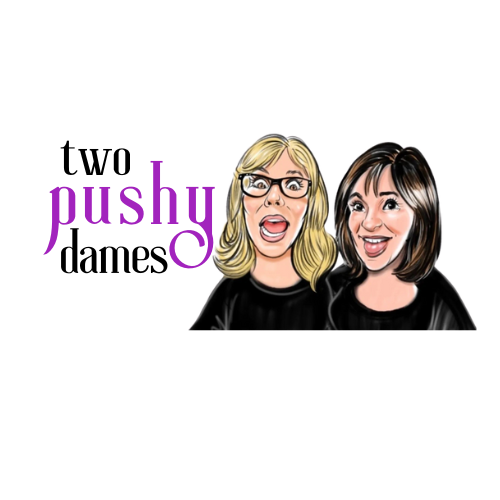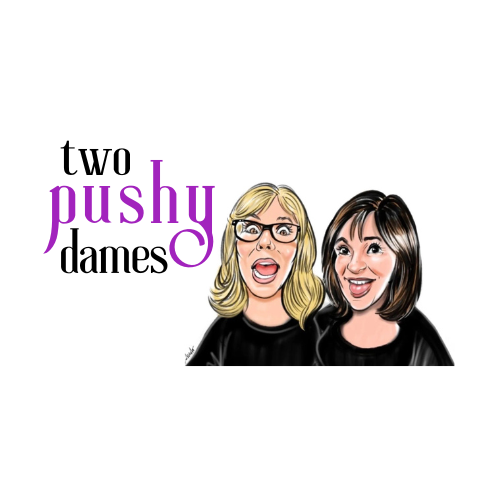Join the Party!
Interested in having training or a keynote at your program or conference?
It’s always a fun time when these Two Dames show up!
Check out our list of popular training & keynote topics below.
Standing Room Only at NAEYC’s Conference in Portland, Oregon
Our Trainings
NEW ‘Team Building Through the Genius of Play’
-
Working with young children can be exhausting and it's important for programs to have strong and happy teams of educators who are in sync with the varying demands of the job - and each other! Help to build stronger connections within your teaching teams and program staff in this active play session.
Wear comfy clothes and shoes for this one - kids aren't the only ones who should play all day!
‘Do You See What I See?’ Making Learning Visible
-
Do you hear what I hear? Do you know what I know? Now that this song is stuck in your head, think about how you make learning visible. Early childhood professionals understand developmentally appropriate practice, but how do you share that knowledge with parents and others who may not know what you know? This training will help you to confidently share the value of play-based learning and spotlight the important work of children through documentation and visuals. This session will focus on ‘diverse learners’ as defined by EEC.
**This session will be a valuable follow-up for educators who have participated in curriculum training from the Two Pushy Dames
‘Childhood. What’s the Rush?‘ Developmentally Appropriate Practices in ECE
-
If we measured our lifespan on a ruler, childhood would be about an inch. Why are we rushing these tiny humans through this joyful and magical time? In this session, we will share the power (and the research) to push back on the academic push down that is rushing childhood.
‘Change is Wicked Hard‘ -Navigating Program Changes
-
Join the Two Pushy Dames to talk about CHANGE and how we all dread it! Working together with colleagues, you will learn to navigate and cope with the many changes the field of ECE is facing due to the coronavirus. Change is difficult. Change is messy. Change is anxiety-producing. Change is also necessary, do-able and often better than what we might first expect!
‘Don’t let yesterday use up too much of today.’ – Cherokee Proverb.
‘How Expressive Arts Support All Children‘
-
Now more than ever, children need opportunities for expressive arts and creative outlets. Heck, adults need it too! This session with The Two Pushy Dames will focus on open-ended curriculum activities for art, dramatic play, block building, music, and movement – both indoors and outdoors. Let’s de-stress a bit as we share our collective strength, offer strategies for success and infuse some exciting curriculum ideas into your daily practice with young children.
‘Loosen Up! Using ‘Loose Parts’ Play with ALL Ages. Yes – Infants and Toddlers, too!‘
-
Loose Parts? What the heck does that mean? Well, we aren’t referring to our aging bodies here! Loose Parts is a simple concept that provides hours of rich, imaginative play and learning for young children, both indoors and outside. The possibilities are limitless! This workshop will focus on the value of Loose Parts play as a vehicle for meaningful, child-directed learning; with lots of time for you to ‘get loose’ with the hands-on materials that will be provided. You’ll leave with lots of exciting ideas for free or very inexpensive Loose Parts to add to your program. This session will focus on diverse learners.
‘Hands-On STEAM Activities’ – Infants, Toddlers, Preschoolers and/or Mixed-Age Groupings
-
You don’t have to be a rocket scientist to know that Science, Technology, Engineering, Arts and Math skills are critical to a successful future. Come to this session to explore a plethora of STEAM activity ideas for various ages, stages and interests. You’ll leave with some new ideas to add to your bag of tricks.
‘Embrace the Mess, Muck and Yuck! The Importance of Sensory Play’
-
Did you know that sensory play can minimize challenging behaviors in children? Or that it can lessen stress and anxiety and help to calm children? Were you aware that sensory play activities expose children to math, science, chemistry and physics concepts? Oh, and that it can be a heck of a lot of FUN to manipulate and explore various sensory materials? No? Then be sure to come to this session to learn more about it. This is truly a hands-on session, so don’t wear your fancy-schmancy clothes.
‘Trauma – An Introduction to Recognizing Trauma Effects in Young Children.’
-
There’s no funny blurb for this session – it is serious business. Many children are regularly exposed to traumatic events in their lives and you, as their teacher, may not even be aware of it. This session will look at recognizing signs of trauma, supporting children and families who have experienced trauma, and creating a trauma-sensitive classroom environment.
'Bias Begins at Birth: Anti-Bias Curriculum'
-
Could young children have biases already? Unfortunately, yes. Let’s make sure that your program operates with an anti-bias lens.
Participants will: Define implicit bias, explore how bias shows itself within the classroom and home childcare settings, and identify strategies to counter bias.
‘PLAY is NOT a Four Letter Word‘
-
We swear! Rich and robust play opportunities provide children with the skills they need to succeed in school and in life. Let’s reduce the academic pressure and focus more on child-directed play, natural exploration and creativity as the vehicle for learning in all of the developmental domains. We will help you to justify the value and critical need for play when you’re asked if children will be ‘ready for kindergarten’ and we will provide many ideas for play-based learning for toddlers and preschoolers.
‘Hooray! They’re Absent Today!’ – Positive Approaches to Dealing with Challenging Behaviors
-
We all know ‘that kid’ – the one who disrupts the classroom, refuses to cooperate, hurts other kids and generally pushes your buttons on a regular basis. Did we mention that he/she is never absent? Yes – THAT kid! This session will focus on how educators can look at the ‘challenging child’ in a different light. Learn several positive and preventive strategies that can make your classroom less chaotic, your children more relaxed, and your day more pleasant.
‘Big Ideas for Little Humans’ -Infant and Toddler Curriculum
-
A quality infant/toddler curriculum focuses on relationships, experiences and routines that are joyful and fun. This session will focus on play-based learning and research based curriculum ideas where educators understand developmentally appropriate practice and how to offer nurturing daily routines and meaningful experiences that meet children’s strengths, interests, and needs.
The Magic of Child-Led Emergent Curriculum
-
Research tells us that play is important and that children learn most when they are self-selecting and actively engaged in their play choices. But educators need to plan, prepare, facilitate, document and assess learning, don't they?! Hmmmm......
This session will highlight the value of child-led play while assisting educators in becoming more reflective in their practice; which will lead to joyful kids, happier teachers and higher quality programming.
‘Cut the Crafts’ – Creative and Expressive Arts for Young Children
-
No young child ever said, ‘Hmmmm…..I think I will trace my hand and turn it into a turkey.’ Honest. Children need to paint, draw, color, glue and explore art materials in a free and expressive way. True ART is not a ‘cute craft’ that the teacher found on Pinterest. So, let’s cut the ‘craptivities’ and get down to the real and creative world of art for young children. LOTS of activity ideas will be shared and none of them will break the budget.
Aretha Knew Best: Building R.E.S.P.E.C.T. Through Professional Practice
-
Early Educators have one of the most important jobs in the world, yet they're often not given the respect they deserve. How do we share the importance of the early years and let others know what we know? How do we professionally let parents and families know that we are the experts? How do we elevate our professional status? How do we stay in this wonderful field without burning out? Let's try to answer these questions and build a more professional early childhood workforce in the process!
Concept Development in the Early Years: It’s More Than A Letter A Week
-
Z my name is Zoe…….and I have to wait 26 weeks before the teacher pays attention to my special letter! If you’ve been utilizing that old ‘Letter of the Week’ strategy, it’s time to re-think that idea and learn some far more effective techniques for increasing language and literacy development for young children.
Is it Scheming? Or is it Schema? Taking a Fresh Look at Challenging Behavior
-
A great follow-up to the “Hooray! They’re Absent” training! We will dive deeper into behaviors and examine why children behave the way they do. Today we will learn about schemas, expectations, neurodiversity, mental health, screens & families. This training provides ‘Diverse Learner’ hours for Massachusetts EEC.
‘Bigger, Bolder, Brighter! Building Stronger Brains through Big Body Play’
-
Did you know that children need to develop their large muscles and core strength before they can hold a pencil appropriately? Did you know that children need to be encouraged to take safe risks in their play in order to build confidence, spatial skills, and leadership qualities? It’s true. This session with The Two Pushy Dames will focus on how educators can best support children’s overall development through vigorous big body play and exciting outdoor activities. Learning Objectives- Participants in this session will: *Discover the benefits of ‘big body play’ and large motor development *Understand the connection between core strength and overall physical development *Recognize that ‘risky play’ is not dangerous and important for children of all ages *Learn about interesting gross motor activities and outdoor play enhancements *Share ideas for developmentally appropriate Big Body and Risky Play experiences for children
Hey, there!
Let’s work together to find the trainings that are right for your program or conference.
























